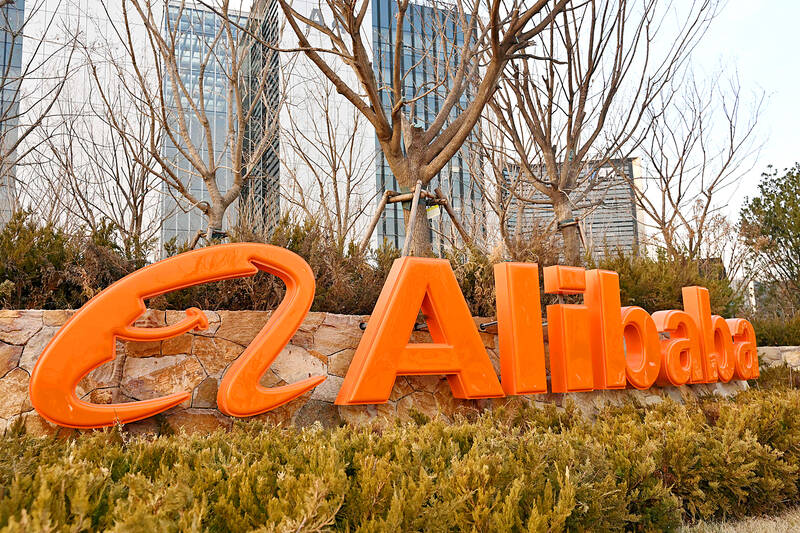Chinese technology and e-commerce giant Alibaba Group Holding Ltd (阿里巴巴) yesterday reported robust sales growth in its latest quarter, beating analyst expectations as Beijing looks to revive faith in the private sector.
The Hangzhou-based firm operates some of China’s most widely used online shopping platforms, making its performance a bellwether for consumer sentiment.
The company is enjoying a comeback with its share price soaring so far this year and legendary co-founder Jack Ma (馬雲) being pictured with Chinese President Xi Jinping (習近平) after spending several years out of the public eye.

Photo: Adek Berry, AFP
The charismatic billionaire once spoke boldly about the shortcomings of China’s financial and regulatory systems but has held his tongue in recent years following Xi’s sweeping crackdown on the tech sector and the scuttling of Alibaba affiliate Ant Group Co’s (螞蟻集團) initial public offering.
Alibaba said yesterday that revenue rose eight percent to 280 billion yuan (US$38.4 billion) in the three months through December, exceeding the 277 billion yuan estimated by a Bloomberg pool of analysts.
The firm’s fastest pace of revenue growth in more than a year reflects a turnaround in its commerce business and big strides into the critical field of artificial intelligence (AI)
The cloud division, which houses the company’s diverse AI-related projects and hosts computing power for external clients, grew revenue 13 percent to US$4.3 billion. International commerce sales — driven by overseas marketplaces such as AliExpress (全球速賣通) and Trendyol — surged 32 percent in the December quarter, the company said.
Net income attributable to ordinary shareholders jumped to nearly 49 billion yuan, a rise of 239 percent, it said.
"This quarter’s results demonstrated substantial progress in our ’user first, AI-driven’ strategies and the re-accelerated growth of our core businesses," Alibaba CEO Eddie Wu (吳泳銘) said.
"We will continue to execute against our strategic priorities in e-commerce and cloud computing, including further investment to drive long-term growth," he added.
Alibaba has benefitted from a strong rally among Chinese technology stocks and has seen its shares soar over 40 percent so far this year.
The strong upturn has owed much to investor optimism over Chinese breakthroughs in AI, with insurgent firm DeepSeek (深度求索) causing a global stir last month with an AI chatbot that seemingly matches US peers at a fraction of the cost.
Alibaba is one of many Chinese technology firms racing to get ahead in the AI space. Last month, it unveiled its latest Qwen (通義千問) AI model that has performed well in benchmark tests.
Alibaba is working with Apple Inc to incorporate its AI technology into Chinese iPhones, the firm said earlier this month.

TAKING STOCK: A Taiwanese cookware firm in Vietnam urged customers to assess inventory or place orders early so shipments can reach the US while tariffs are paused Taiwanese businesses in Vietnam are exploring alternatives after the White House imposed a 46 percent import duty on Vietnamese goods, following US President Donald Trump’s announcement of “reciprocal” tariffs on the US’ trading partners. Lo Shih-liang (羅世良), chairman of Brico Industry Co (裕茂工業), a Taiwanese company that manufactures cast iron cookware and stove components in Vietnam, said that more than 40 percent of his business was tied to the US market, describing the constant US policy shifts as an emotional roller coaster. “I work during the day and stay up all night watching the news. I’ve been following US news until 3am

UNCERTAINTY: Innolux activated a stringent supply chain management mechanism, as it did during the COVID-19 pandemic, to ensure optimal inventory levels for customers Flat-panel display makers AUO Corp (友達) and Innolux Corp (群創) yesterday said that about 12 to 20 percent of their display business is at risk of potential US tariffs and that they would relocate production or shipment destinations to mitigate the levies’ effects. US tariffs would have a direct impact of US$200 million on AUO’s revenue, company chairman Paul Peng (彭雙浪) told reporters on the sidelines of the Touch Taiwan trade show in Taipei yesterday. That would make up about 12 percent of the company’s overall revenue. To cope with the tariff uncertainty, AUO plans to allocate its production to manufacturing facilities in

Six years ago, LVMH’s billionaire CEO Bernard Arnault and US President Donald Trump cut the blue ribbon on a factory in rural Texas that would make designer handbags for Louis Vuitton, one of the world’s best-known luxury brands. However, since the high-profile opening, the factory has faced a host of problems limiting production, 11 former Louis Vuitton employees said. The site has consistently ranked among the worst-performing for Louis Vuitton globally, “significantly” underperforming other facilities, said three former Louis Vuitton workers and a senior industry source, who cited internal rankings shared with staff. The plant’s problems — which have not

TARIFF CONCERNS: The chipmaker cited global uncertainty from US tariffs and a weakening economic outlook, but said its Singapore expansion remains on track Vanguard International Semiconductor Corp (世界先進), a foundry service provider specializing in producing power management and display driver chips, yesterday withdrew its full-year revenue projection of moderate growth for this year, as escalating US tariff tensions raised uncertainty and concern about a potential economic recession. The Hsinchu-based chipmaker in February said revenues this year would grow mildly from last year based on improving supply chain inventory levels and market demand. At the time, it also anticipated gradual quarter revenue growth. However, the US’ sweeping tariff policy has upended the industry’s supply chains and weakened economic prospects for the world economy, it said. “Now